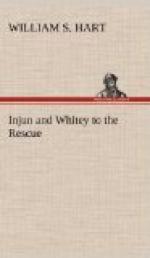But the extraordinary effect of the affair was the change in Gil Steele. As Bill Jordan said, it had “jarred Gil loose from his meanness.” The result of this jarring was that Gil presented Whitey with the iron-gray colt, with a silver-mounted saddle and bridle. The neighborhood gasped at that, and gasped again when Gil gave Injun a pair of gold-mounted six-guns, with an embossed leather cartridge-belt and holsters. You can imagine the figure Injun cut when decorated with these. And he slept with them on.
And, pleasing to relate, Gil prospered more when he was generous than he had when he was mean. In time he became very well off.
Things seemed to be coming Whitey’s way, for the school problem was solved, too. Mr. Sherwood brought this news from the East. John Big Moose was to return. Not that John had been unsuccessful in the Eastern college; far from that. He had gained the respect and esteem of the students. It is true that they called him “Big Chief,” but there was more affection in the nickname than even the boys suspected.
But John was like many another man—and boy—who, when he gets what he wants, finds that he doesn’t want it so much, after all. It was not only that John longed for the greater reaches and the free life of the West; he felt a call to return to and to aid his own people. There were plenty of men to teach in colleges; there were few who could help the Indians as John could.
And he agreed to direct Injun and Whitey’s studies until the time came for them to go away to school, which would not be long.
So, with Henry Dorgan safely in jail awaiting trial, and a vacation in prospect, pending John Big Moose’s return, something must be done. Wouldn’t do for the boys to sit around twirling their thumbs. They began to talk about this, or rather Whitey began to talk and Injun to slip in a grunted word now and then; and suddenly Whitey had an idea.
Often on the plains and in the mountains Whitey had thought of the pioneer days of the West; thoughts such as the country arouses in the minds of all boys and of some men. Whitey could close his eyes and imagine that he saw an old wagon train wending its way across the prairie, its line of white-topped schooners drawn by drooping, tired horses, its outriding guard of scouts, clad in buckskin, alert, keen-eyed, each with a long rifle resting in the hollow of his arm. Or in the mountains he saw an old, fur-capped trapper crouch behind the shelter of a boulder, his single-shot, heavy-barreled rifle directed toward an unconscious, lumbering grizzly, the trapper’s life hanging on the accuracy of his one shot. Yes, like all boys Whitey was full of these dreams.
“Injun, we’ll take a pioneer hunting trip!” he cried.
It took a little time to explain this matter to Injun, but when it was explained Injun was keen for the plan, too, for his being Injun didn’t make him different from any other boy at heart. He was to take his bow and arrows. Whitey would borrow an old-fashioned Springfield rifle, that belonged to his father. There would be no Winchester repeaters, nor trout rods with multiplying reels, nor any of the modern weapons for slaying game or fish. It would be a sort of return to the wild.




